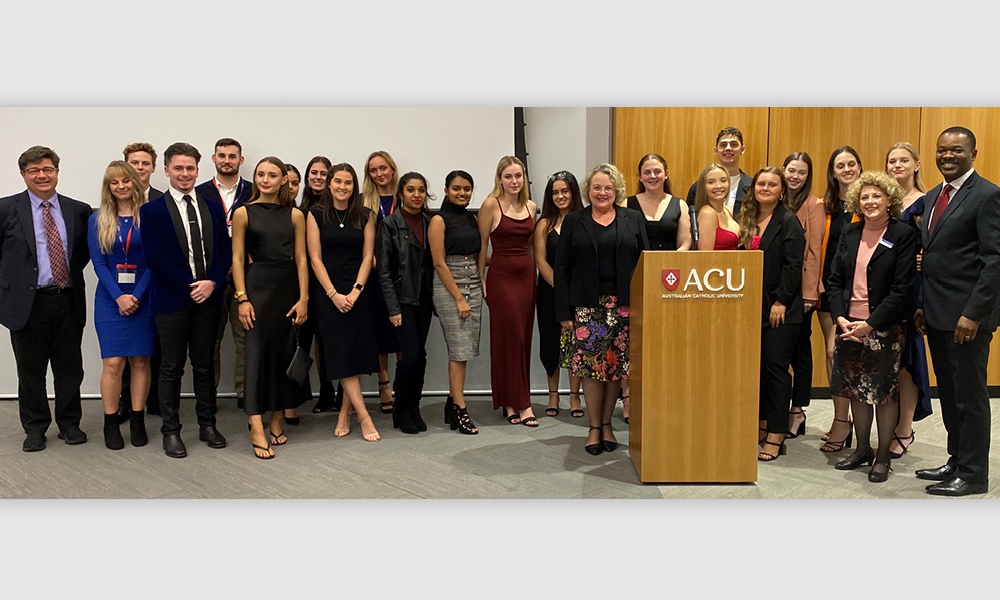Queensland Law Society President Elizabeth Shearer last night addressed students at the Australian Catholic University’s new Thomas More Law School in Banyo, Brisbane.
The occasion was the inauguration of the McAuley Campus Law Students’ Society (Banyo).
The law school, which opened in January this year under the leadership of Dean Professor Patrick Keyzer, also has campuses in Melbourne, North Sydney and Blacktown. It has 32 students, with the first graduation due in 2024.
In her speech, Ms Shearer responded to a request to reflect on the two or three things that she wished she had known as a law student. She responded that the first one was, ‘There is more than one definition of success’.
“Don’t be constrained by other people’s ideas of success,” she said. “A successful career is one in which you work in jobs that are a good fit for your skills, interests and values. And that may change at different times in the course of your career.
“In a tight job market, you may not have a lot of choice about your first job, but whatever job you take, use it as an opportunity to learn as much as you can – even if what you learn is that it’s not the sort of job you want to stay in. If it’s not your dream job, still give it and your employer the respect they deserve and work conscientiously and to the best of your ability while you are there.
“The second thing I wish I had known was about imposter syndrome. That’s the feeling that you have that people will find out that you’re not as capable and knowledgeable as they think you are.
“It’s easy to feel this in a new job, in an unfamiliar environment, when everything you do is novel, and it’s very easy to feel this in legal practice. Even today, after 35 years in practice, there’ll be a question I don’t know the answer to at least once a week.
“So don’t lose confidence because you don’t know all the answers.
“As you progress in your career you gain confidence in using your skills to solve novel problems. So, it no longer bothers me that I don’t know all the answers, because I know I can use my tools of the trade to get to it.
“The essence of being a lawyer is that we:
- Discern relevance from a mess of facts.
- We state the problem clearly.
- We use our knowledge of legal principles and our research skills to identify the relevant law.
- We apply the law to the facts.
- We exercise professional judgment to analyse options and recommend a course of action.
“If you can use these skills, you are not an imposter. There is a lot to learn and absorb in the early years of practice. People routinely feel that they’ll be found out for what they don’t know. But focus on what you do know, and more importantly the skills you can apply to solve novel problems.
“And don’t be afraid to ask for help. We are a collegiate profession, and the senior members of the profession take seriously their responsibility to junior members. This happens informally, but we also have systems to support it. For example, the Law Society appoints Senior Counsellors who are experienced practitioners who volunteer to take queries from anyone in the profession about difficult professional or ethical problems.
“Finally, the third thing I wish I’d known is that the golden rule applies to practice development.
“Whether you locate its source in religion, ethics or just common sense, the golden rule is simple. Treat other people the way you would like to be treated.
“Imagine for a minute that you are the client and not a budding lawyer. Imagine you have a problem that you need to see a lawyer about.
“What matters more to you as a client:
- Listening to the lawyer talk? Or feeling that the lawyer has listened to you and understands what you want to achieve?
- Do you want an erudite exposition of the law as it may or may not apply to your situation? Or do you want to know whether or not you can achieve your desired outcome?
“Sometimes, as lawyers we tend to stop listening when we have what we think we need from the client. We also like opportunities to display our knowledge, which, after all we spent a long time acquiring. We like to write letters that show our superlative command if abstruse English and legal jargon. But if we stop and think what the client wants, this changes the way we practise.
“Clients may not be equipped to assess your technical competence as a lawyer, but they do notice:
- if you do what you say you are going to do
- if you do it in the time frame you said you would
- it costs what you said it would, and
- if the results match or exceed their expectations.
“They have the tangible experience of how you make them feel:
- Respected? Or patronised?
- Valued? Or an unwelcome interruption?
“It doesn’t matter whether it’s a large commercial client or an individual. There’s always a person who is your client, and they always remember how you made them feel.
“If you did a good job and made them feel valued, you will develop a loyal client and referrer following. People will come back to you when they next need legal help. They will tell people about you. This is personal to you. If you move practices, loyal clients will track you down, even years later.
“People sometimes think, in an environment where technology is developing rapidly, this personal connection is less important. In my view it’s even more important.
“As some parts of legal practice become automated by artificial intelligence, legal practice will change, as it always has.
“But there is no artificial wisdom. People will still come to lawyers, and if we treat them as we would like to be treated, they will value our role as trusted advisor to navigate difficult problems.
“This personal connection to a trusted advisor who can exercise professional judgment to recommend action to solve difficult problems, will be more important than ever.”













Share this article